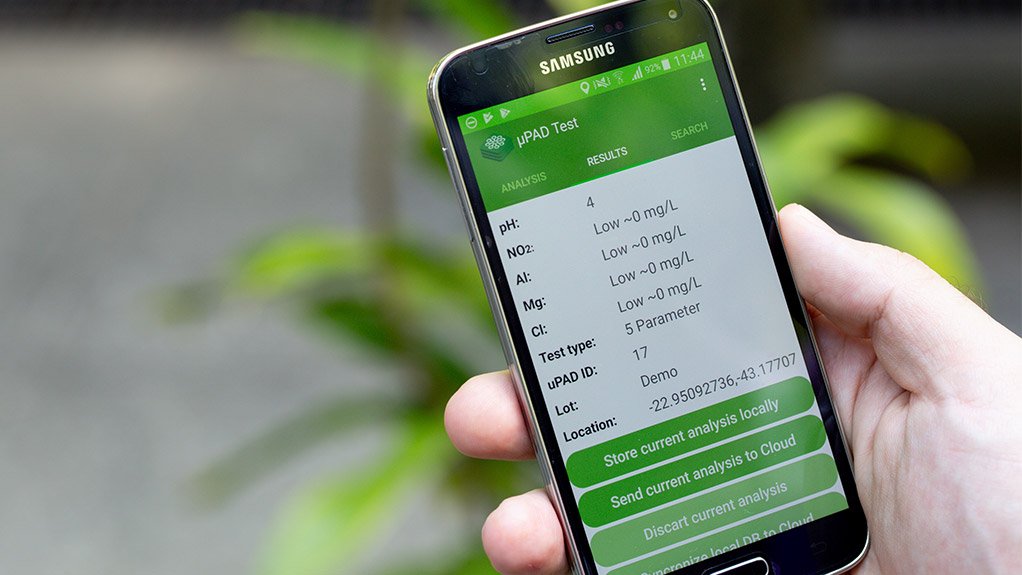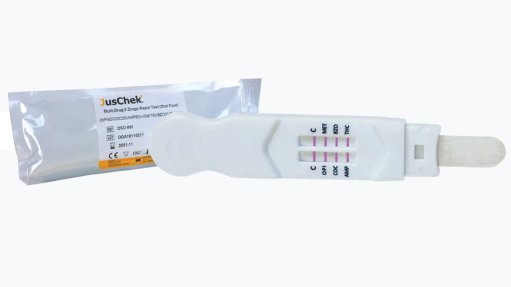Prototype soil sampling device being tested for use in agriculture



AGROPAD SCAN Farmers can gain meaningful information to optimise conditions to grow a specific crop
TEST RESULTS AI and machine learning present an opportunity to increase the efficiency of agriculture and fertiliser use
A cost-effective hand-held soil and water chemical testing device for use in agriculture is being developed and tested by information technology research subsidiary IBM Research, says IBM Research Brazil Industrial Technology & Science manager Dr Mathias Steiner.
The AgroPad is a business-card-size device with a microfluidics chip embedded in a paper matrix onto which the water or soil sample is placed. The fluids pass through the paper, owing to capillary forces, and into the channels of the self-powered chip. The chip conducts an analysis of the content of the sample and then produces a coloured representation of the results.
This representation is too nuanced for the human eye to discern, and the AgroPad relies on the sensing capabilities of smartphone cameras, machine learning and a database of verified outputs to produce a detailed report for a user.
“The colour encodes the information about the chemical quantities, the pH value and the amount of chlorides, for example,” Steiner explains.
The real-time, on-location tool makes it possible for farmers to monitor the health of their soil and water using artificial intelligence (AI). This prototype is designed to ensure the quality of water and soil, complementing often time-consuming laboratory tests and changing digital agriculture and environmental testing.
Part of the prototype and trial tests include broadening the verified chemical database that the device can test. Researchers are aiming to broaden the sensing capabilities of future microfluidics chips to test for different chemical species and refine the tests that will be most important or most broadly applicable.
The researchers are also determining the potential large-scale applications and uses, such as greater near-real-time information about agriculture in a region.
The test data can be streamed onto a cloud computing platform and labelled with a digital tag that identifies the time, location and results of the chemical analysis.
The cloud platform allows for the management and integration of millions of individual tests performed at various times and locations. This is an important feature for monitoring – for example, the change in fertiliser concentration in a particular region throughout the year, he says.
This ‘AI on the edge’ computing approach uses machine learning and visual analytics algorithms to translate the measured colour composition and intensity into concentrations of chemicals in the sample.
“We believe we can create value at different scales of use. The farmer working with a single or a few AgroPads can test the soil and water across the farm and retrieve the results when needed using a smartphone. The farmer can gain meaningful information and recommendations for fertiliser use to optimise conditions to grow a specific crop,” says Steiner.
“The transmitted data from individual farmers can be used for larger-scale mapping across a geography and can, importantly, be used to determine the scale and intensity of chemical distribution in soil and water over time. Large-scale chemical mapping can also be derived from the collected test results.”
Analytics systems can also leverage the growing data available to produce more detailed insight into an agriculture sector of a region or an economy.
Steiner adds that, while the research is currently focused on Brazil, the company would welcome African participants and partners. IBM has two research laboratories in Africa.
AI and machine learning present an opportunity to increase the efficiency of agriculture and fertiliser use and the researchers foresee industrial applications that can be developed from the AgroPad system, he concludes.
Article Enquiry
Email Article
Save Article
Feedback
To advertise email advertising@creamermedia.co.za or click here
Press Office
Announcements
What's On
Subscribe to improve your user experience...
Option 1 (equivalent of R125 a month):
Receive a weekly copy of Creamer Media's Engineering News & Mining Weekly magazine
(print copy for those in South Africa and e-magazine for those outside of South Africa)
Receive daily email newsletters
Access to full search results
Access archive of magazine back copies
Access to Projects in Progress
Access to ONE Research Report of your choice in PDF format
Option 2 (equivalent of R375 a month):
All benefits from Option 1
PLUS
Access to Creamer Media's Research Channel Africa for ALL Research Reports, in PDF format, on various industrial and mining sectors
including Electricity; Water; Energy Transition; Hydrogen; Roads, Rail and Ports; Coal; Gold; Platinum; Battery Metals; etc.
Already a subscriber?
Forgotten your password?
Receive weekly copy of Creamer Media's Engineering News & Mining Weekly magazine (print copy for those in South Africa and e-magazine for those outside of South Africa)
➕
Recieve daily email newsletters
➕
Access to full search results
➕
Access archive of magazine back copies
➕
Access to Projects in Progress
➕
Access to ONE Research Report of your choice in PDF format
RESEARCH CHANNEL AFRICA
R4500 (equivalent of R375 a month)
SUBSCRIBEAll benefits from Option 1
➕
Access to Creamer Media's Research Channel Africa for ALL Research Reports on various industrial and mining sectors, in PDF format, including on:
Electricity
➕
Water
➕
Energy Transition
➕
Hydrogen
➕
Roads, Rail and Ports
➕
Coal
➕
Gold
➕
Platinum
➕
Battery Metals
➕
etc.
Receive all benefits from Option 1 or Option 2 delivered to numerous people at your company
➕
Multiple User names and Passwords for simultaneous log-ins
➕
Intranet integration access to all in your organisation


















